Are you looking for a new 10-cent coin to add to your collection? If yes, then you should consider the 1996 dime. It is a relatively old coin, and it should be more valuable than the newer dimes.
Read through this post and learn more about the history, value, composition, and design of the 1996 dime.
What Is the 1996 Roosevelt Dime Made Of?
The composition of a coin directly affects its value. So, it’s good to know what the 1996 Roosevelt dime is made of.
According to the US Mint, the 1996 Roosevelt dime is made of 75% copper and 25% nickel. The core of the dime is made of pure copper. While the surface is wrapped around with nickel.
The US Mint had been minting the Roosevelt dime from 1946 to now. From 1946 to 1964, the Roosevelt dime was made of silver. Then, by the Coinage Act of 1965, all regular coins were turned into base metals.
The 1996 Roosevelt dime has a value of 10 cents, a mass of 2.27 grams, a diameter of 17.91 millimeters, and a reeded edge. The designer of the 1996 Roosevelt Dime is John Sinnock.
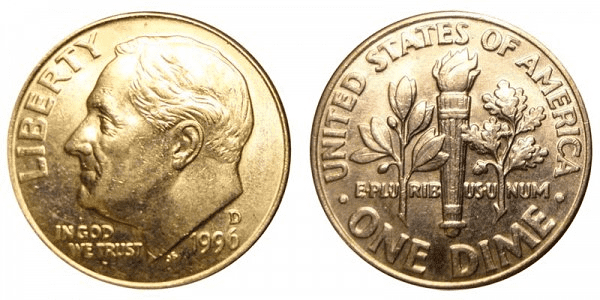
Regarding design, the 1996 dime features the face of Franklin Roosevelt, the 32nd president who led the country through the Great Depression and World War II.
On the reverse of the coin, you’ll find the olive branch, which symbolizes peace; the oak branch, which symbolizes strength; and the Liberty Torch, which symbolizes enlightenment.
Sinnock’s design for the dime wasn’t accepted immediately by the Commission of Fine Arts. Thus, he needed to change his design multiple times to meet the standards set by the commission.
Moreover, many people welcomed the idea of having Roosevelt on a US coin at that time. However, some oppose the move. According to the opposition, one reason was that Roosevelt’s accomplishments couldn’t be at par with what Washington, Jefferson, and Lincoln accomplished. These presidents are already on a US coin.
Aside from that, some people think the dime won’t do justice in honoring the late president. Plus, they believe that the mercury dime was so nice to be replaced.
Nevertheless, Congress prevailed, and now, the United States has one of its most popular coins, the Roosevelt dime.
1996 Roosevelt Dime Varieties
The 1996 Roosevelt dime comes in four varieties. The Denver, Philadelphia, West Point, and San Francisco Mint Centers worked together to produce more than 2 billion dimes in 1996. This is the fifth time in the Roosevelt Dime’s history that the mintage figure for a given year exceeds 2 billion.
Here’s a table to show you the different varieties of the 1996 Roosevelt Dime as well as their mintage:
| Variety | Mint Location | Mintage |
| 1996 D Roosevelt Dime | Denver | 1,400,300,000 |
| 1996 P Roosevelt Dime | Philadelphia | 1,421,163,000 |
| 1996 W Roosevelt Dime | West Point | 1,457,000 |
| 1996 S Proof Roosevelt Dime | San Francisco | 1,750,244 |
| Total | 2,824,670,244 |
Now, let’s have a more detailed look at each of the varieties of the 1996 Roosevelt dime:
1996 D Roosevelt Dime
Year of minting: 1996
Mint Mark: D
Place of minting: Denver
Quantity produced: 1,400,300,000
Face Value: $0.10 (ten cents)
Price: $0.15 to $0.35 (circulated condition)
Mass: 2.27 grams
Edge: Reeded
Designer: John R. Sinnock
Composition: 75% copper, 25% nickel
Diameter: 17.90 millimeters
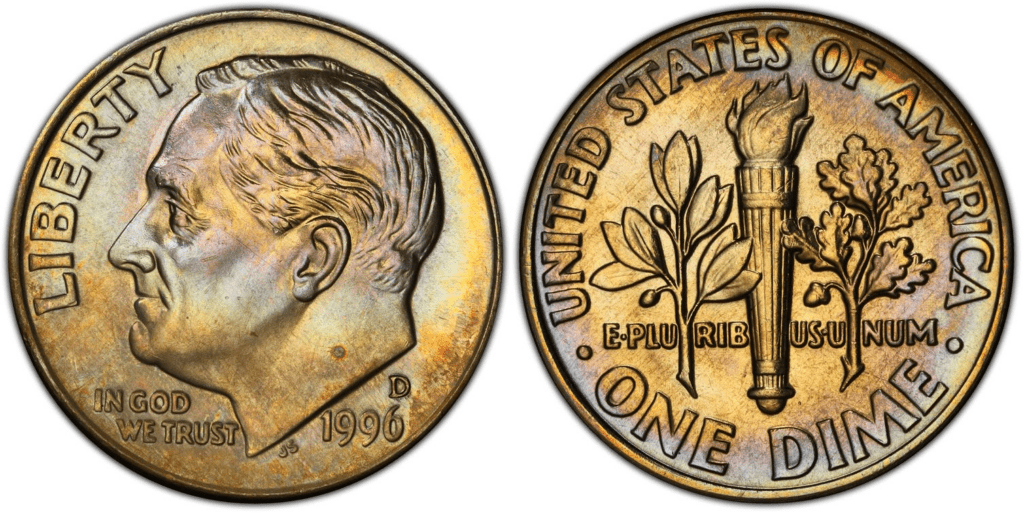
The Denver Mint produced more than 1.4 billion dimes in 1996. This mintage figure is higher than the mintage figures of 1995 and 1997.
1996 P Roosevelt Dime
Year of minting: 1996
Mint Mark: P
Place of minting: Philadelphia
Quantity produced: 1,421,163,000
Face Value: $0.10 (ten cents)
Price: $0.15 to $0.35 (circulated condition)
Mass: 2.27 grams
Edge: Reeded
Designer: John R. Sinnock
Composition: 75% copper, 25% nickel
Diameter: 17.90 millimeters
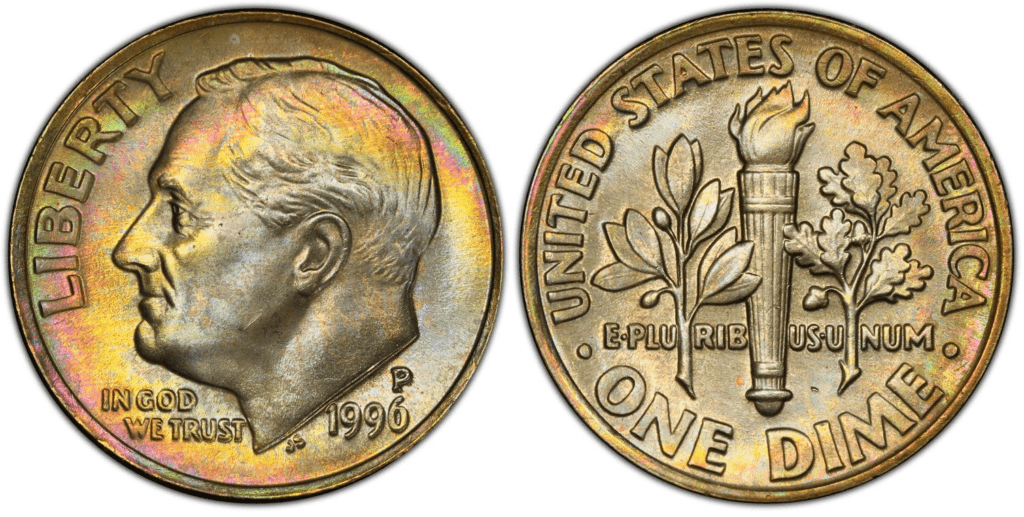
With more than 1.4 billion dimes, the Philadelphia Mint produced the most 10-cent coins in 1996. However, the difference wasn’t that big if you compare the mintage figure from the Denver Mint.
1996 W Roosevelt Dime
Year of minting: 1996
Mint Mark: W
Place of minting: West Point
Quantity produced: 1,457,000
Face Value: $0.10 (ten cents)
Price: $0.15 to $0.35 (circulated condition)
Mass: 2.27 grams
Edge: Reeded
Designer: John R. Sinnock
Composition: 75% copper, 25% nickel
Diameter: 17.90 millimeters
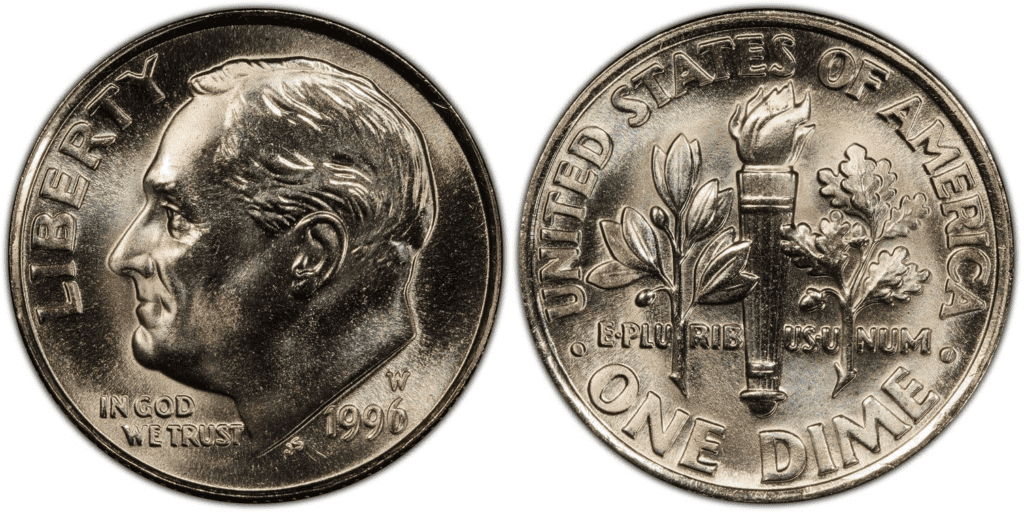
The West Point mint center helped produce the Roosevelt dime and met the great demand for the coin. The mint center contributed more than 1.4 million dimes. However, it should be noted that the dimes coming from West Point Mint wasn’t made for circulation but were part of the 1996 uncirculated dimes sold by the US Mint.
1996 Proof Roosevelt Dime
Year of minting: 1996
Mint Mark: S
Place of minting: San Francisco
Quantity produced: 1,750,244
Face Value: $0.10 (ten cents)
Price: $11 or more (uncirculated condition)
Mass: 2.27 grams
Edge: Reeded
Designer: John R. Sinnock
Composition: 75% copper, 25% nickel
Diameter: 17.90 millimeters
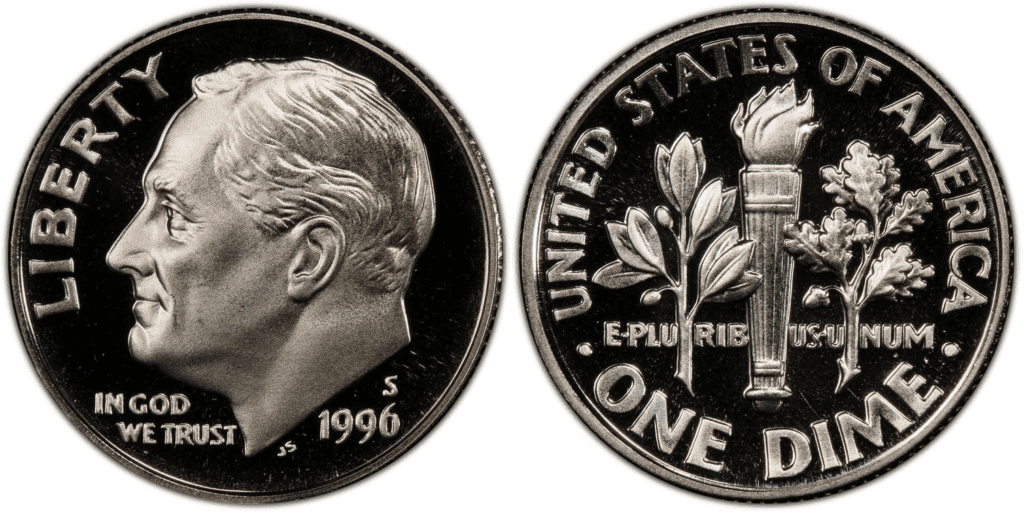
Proof coins were also made in 1996 for the dimes. The San Francisco Mint issued more than 1.7 million proof dimes.
List Of 1996 Roosevelt Dime Errors
There were more than one billion dimes produced in 1996. So, you can expect that there were some coins made with errors.
Error coins are quite interesting because they are potentially valuable and rare. Here are some examples of 1996 Roosevelt dime errors:
Broadstrike error
The metal used in minting coins is malleable. That’s why, upon the moment of the strike, it should be securely held in place so that it will not flow out of the confines of the die. However, the collar die, the one that prevents broadstrike, malfunctions. As a result, the coin spreads out.
Here’s an example of a broadstrike error in a 1996 dime:
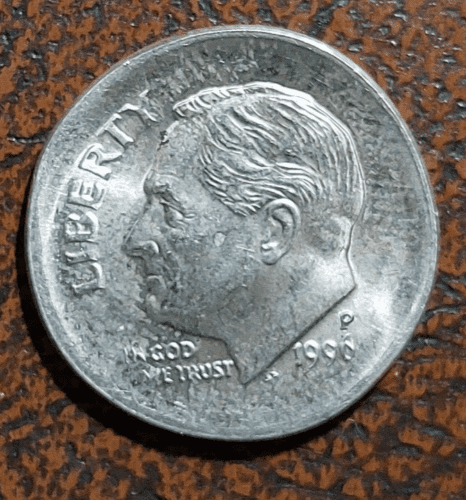
Notice the edge of the coin. The broadstrike error made the coin spread out like a pancake.
Off-center strike error
An off-center strike error happens when the strike is not hit at the center of the coin but rather on the edge. A misalignment between the die and the planchet usually causes this.
Here’s an example of an off-center strike error:
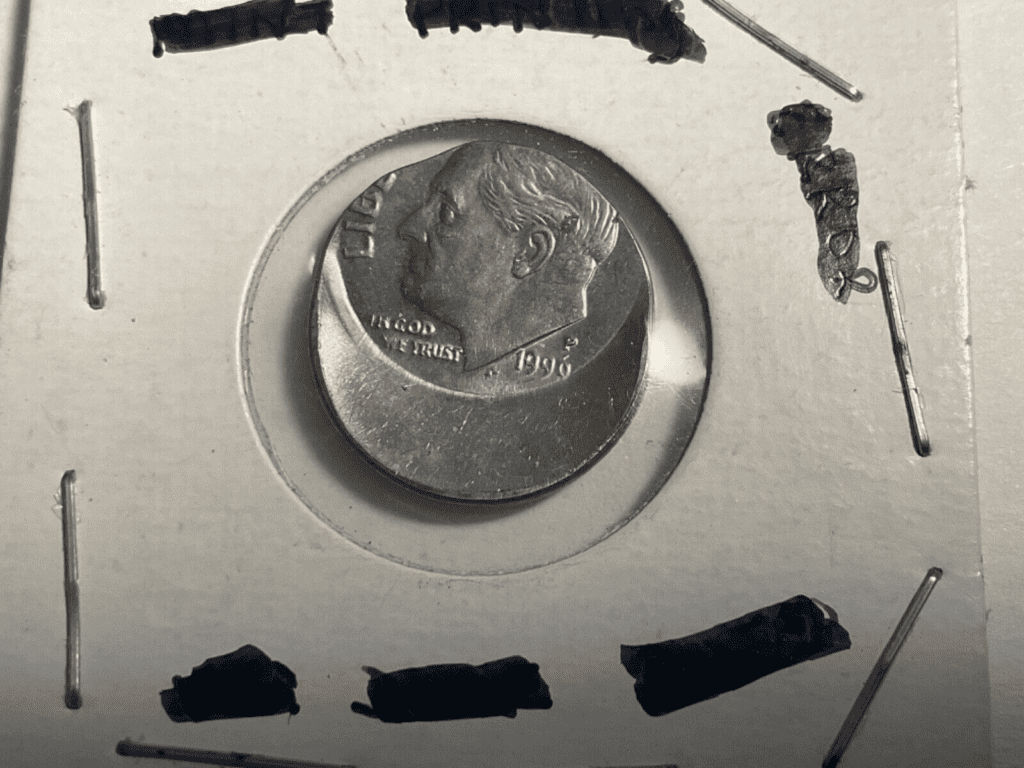
Missing clad error
The outer layer of a 1996 dime is made of nickel. The nickel gives the dime its luster. However, there are times when the nickel doesn’t effectively cover the dime, so it looks like this:
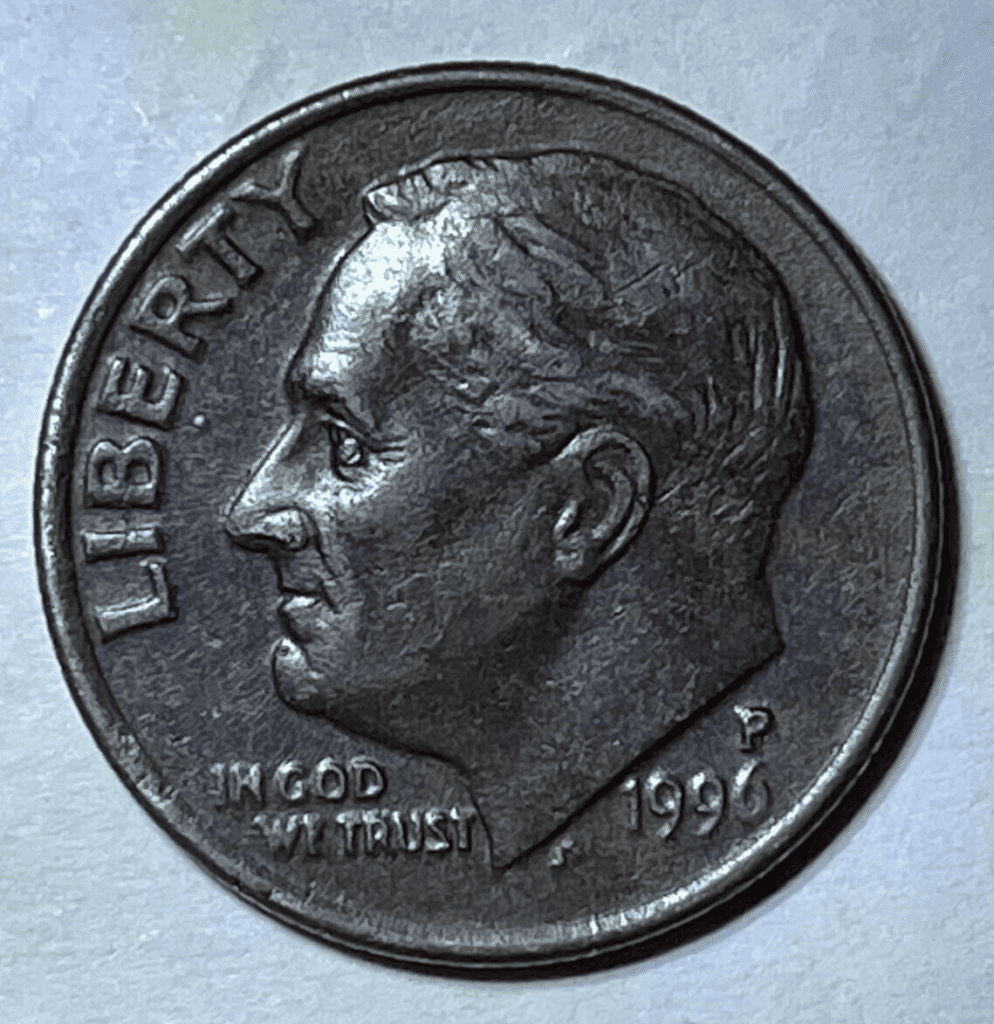
How Much Is 1996 Roosevelt Dime Worth Today?
When buying, selling, and collecting the 1996 Roosevelt dime, people’s most important question is its value.
The 1996 dime doesn’t have precious metals in it. So, you can expect to trade it at its face value. The melt value is $0.0237. The price of a circulated 1996 dime can be just less than a dollar.
As this might be the case, some 1996 dimes were sold for more. To give you an idea, here’s a table to show you the auction records for each 1996 dime variety:
| Coin | Condition | Grade | Sold date | Sold by | Value |
| 1996 P Roosevelt Dime | Superb Gem Uncirculated | MS 68 – (Full Band) | July 1, 2021 | eBay | $1,385 |
| 1996 D Roosevelt Dime | Superb Gem Uncirculated | MS 68 (Full Band) | April 21, 2022 | eBay | $750 |
| 1996 Proof Roosevelt Dime | Superb Gem Uncirculated | PR 68 – Deep Cameo | June 23, 2021 | Heritage Auctions | $600 |
| 1996 W Roosevelt Dime | Superb Gem Uncirculated | MS 69 (Full Band) | December 4, 2013 | Heritage Auctions | $411 |
How Does The Grading System Work?
Professional numismatists joined in the 1970s and established CoinGrading standards, known as the Sheldon Scale. These numismatists now assign grades at key places on the seventy-point scale, using the most regularly utilized numeric points in conjunction with the original adjective grade. The following are the most common coin grades:
- (P-1) Poor – Indistinguishable and probably damaged; if used, must have a date and mintmark; otherwise, rather battered.
- (FR-2) Fair – Nearly smooth, but without the damage that a coin graded Poor often possesses. The coin must have enough detail to be identified.
- (G-4) Fair – Inscriptions have merged into the rims in some areas, and important elements have been mostly erased.
- (VG-8) Very Good- A little weathered, but all primary design elements are visible, albeit faintly. There is little, if any, central detail left.
- (F-12) Good – The item is very worn, yet the wear is even, and the overall design details stand out clearly. Rims are almost completely isolated from the field.
- (VF-20) Very Fine – Moderately weathered, with some finer features still visible. The motto or all letters of LIBERTY are readable. Both sides of the coin have entire rims separated from the field.
- (EF-40) Extremely Fine – Gently used; all gadgets are visible, and the most important ones are bold. The finer details are bold and clear; however, light wear may be seen.
- (AU-50) Uncirculated – Slight evidence of wear on the coin’s design’s high points; it may have contact marks; eye appeal should be adequate.
- (AU-58) Uncirculated Choice – Slight traces of wear, no severe contact marks, almost full mint shine, and great eye appeal.
- (MS-60) Mint State Basal – Strictly uncirculated; no indication of wear on the coin’s highest points, but an unsightly coin with reduced luster, visible contact marks, hairlines, and other flaws.
- (MS-63) Mint State Acceptable – Uncirculated, but with contact scratches and nicks, little reduced shine, but otherwise appealing appearance. The strike is weak to average.
- (MS-65) Mint State Choice – Uncirculated with great mint shine, little contact blemishes, and exceptional eye appeal. The strike is unusually severe.
- (MS-68) Mint State Premium Quality – Uncirculated with superb luster, no obvious contact marks to the naked eye, and exceptional eye appeal. The strike is quick and appealing.
- (MS-69) Almost Perfect Mint State – Uncirculated with perfect brilliance, a sharp and appealing strike, and extremely good eye appeal. A near-perfect coin with minor imperfections in the planchet, strike, and contact markings (seen only under 8x magnification).
- (MS-70) Mint State Perfect – Under 8x magnification, no tiny imperfections are discernible; the strike is crisp, and the coin is perfectly centered on a beautiful planchet. Rarely seen on a coin, this coin is bright and whole, with original luster and exceptional eye appeal.
Where To Buy Or Sell 1996 Roosevelt Dime?
If you are planning to buy or sell a 1996 Roosevelt Dime, it helps to know where to do your transaction.
The quickest way to buy or sell 1996 Roosevelt dimes would be online. There are a lot of platforms that would help you do this. Some suggestions would include Amazon, Etsy, and of course, eBay. You can also try specialized websites such as USA Coin Book, Coin Appraiser, and Grey Sheets.
Aside from the Internet, you can go to coin shops, antique stores, pawnshops, and auction houses. While there’s no guarantee that these places have 1996 dimes, they are still worth the try.
FAQs
How rare is a 1996 W dime?
The 1996 W dime isn’t rare since there were 1,457,000 of them issued by the US Mint. Nevertheless, they can become rare if they have a grade of at least MS 68.
How much does a 1996 dime weigh?
The 1996 dime weighs 2.27 grams.
